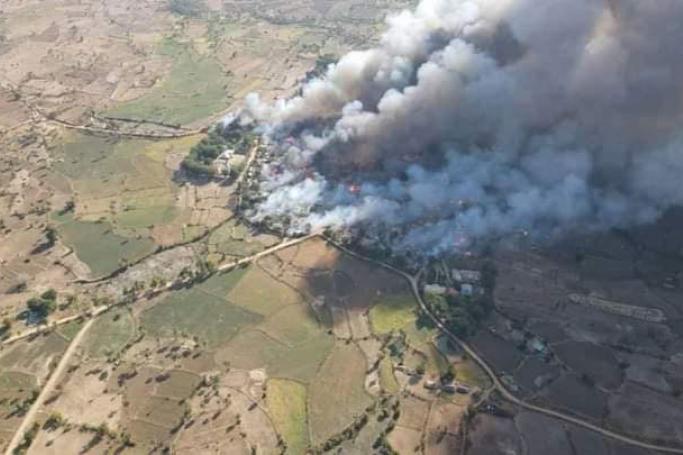Myanmar’s military has continued to carry out air strikes that have targeted civilians, including internally displaced persons (IDPs), villages, and civilian infrastructure including schools, according to a special report released by the Associates to Develop Democratic Burma [ADDB] Inc on March 2, 2023, the 61st anniversary of the first Myanmar coup led by General Ne Win in 1962.
The 44-page special report is based on research and documentation conducted by various organisations, including the Karen National Union, Chin National Front, Kachin Independence Army, Karenni National Progressive Party, the Salween Institute for Public Policy, as well as Karenni human rights organisations and the Free Burma Rangers, a humanitarian NGO.
The report ‘Myanmar Military Air Strikes Target Civilians: An ASEAN Member State’s Air Force Bombing IDPs, Villages, and Civilian Infrastructures ’highlights that the junta's military has continued to carry out these unethical airstrikes despite agreeing to the Five Point Consensus (5PCs) at the ASEAN Leaders' Meeting in April 2021.
It also explains how the junta forces have faced heavy losses in rural and ethnic regions leading to an increase in the use of air power against various regions and populations. “The heavy losses which the Myanmar Forces have suffered in the vast rural and ethnic regions in the face of nationwide armed resistance and effective sabotage, is a factor behind the increasingly frequent and widespread deployment of air power against multiple regions and populations,” said the report.
“Notably, only the capital Nay Pyi Taw, the Ayeyarwady Delta region, the commercial and former capital Yangon, and the narrow coastal region of Tanintharyi of Southern Myanmar have not been attacked by the Myanmar Air Force,” said the report.
The special report also mentioned leaked documents–marked ‘Secret ’and dated 23 December 2022 “which contain the detailed minutes of the 7-hour meeting of regional and national level heads of security agencies held at the Police Headquarters in Nay Pyi Taw.” That meeting was presided over by Lieutenant-General Soe Htut, one of the key members of Min Aung Hlaing’s military council.
Participants of the above-mentioned meeting reported to the junta’s Home Affairs Minister that 12 out of the 14 regions are zones of violent conflicts. Some participants talked of the need for more bullet-proof vests, more air strikes and fortification of police and security stations across the country.
The Myanmar Armed Forces have historically used coordinated air and ground operations against ethnic armed organisations, targeting their military bases and headquarters, said the report. However, since the coup two years ago, there has been a sharp break from this pattern, with civilians being targeted in air strikes, including violence-fleeing IDPs, schools, hospitals, residential quarters, and places of worship.
The special report also discusses the shift in the Myanmar military's objectives from counter-insurgency to a new, warped counter-terrorism paradigm that targets civilians and pro-democracy individuals and organisations as "terrorists." The military aims to break the morale of local communities that support the popular armed resistance against the junta, create a humanitarian burden for the local resistance groups, slow down the advances of resistance organisations, and eliminate all anti-coup individuals by any means necessary.
The report discusses the junta’s use of air strikes against civilian populations, which poses a great challenge to ASEAN. It calls for concrete steps as measures of accountability, including suspending security cooperation with the Myanmar military, ensuring no ASEAN member state is involved in supplying Myanmar’s military forces with lethal assistance, and adopting stringent measures to prevent ASEAN-based commercial and financial institutions from financing Myanmar security ministries and their commercial affiliates.
The report notes that ASEAN's failure to intervene in the past in Cambodia and Myanmar's genocide against Rohingya Muslims puts its international reputation and credibility at grave risk. It also highlights the importance of viewing the Myanmar military's actions as state-directed terrorism and urges the ASEAN and the United Nations to take action.
The ADDB, better known as the Euro-Burma Office, is a not-for-profit organization established in 1990, incorporated in Canada in 1994 and led by long-time democrats drawn from Myanmar’s diverse ethnic and religious communities.












